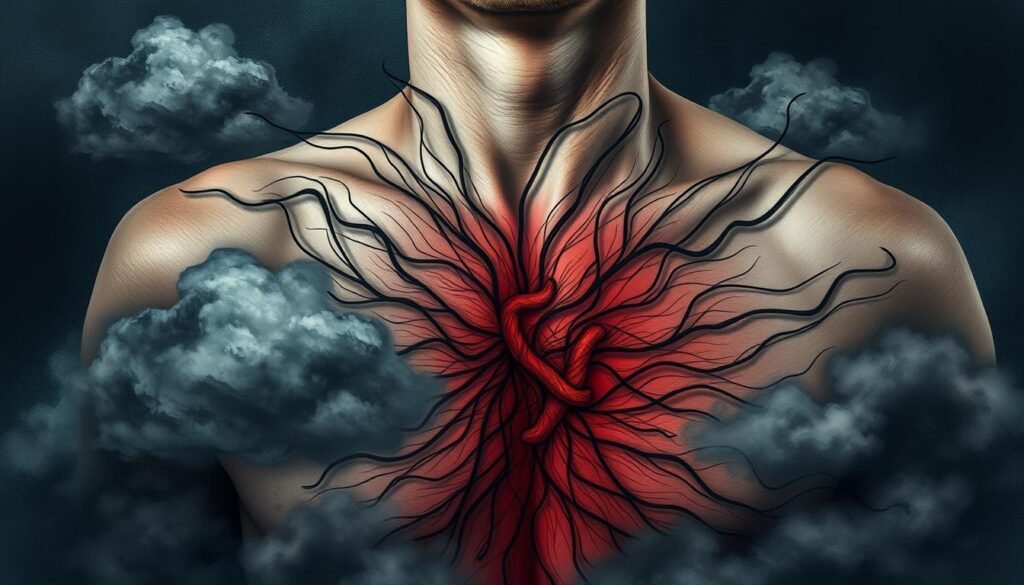Did you know 12–16% of people feel chest pain sometime in their lives? Often, this pain comes from anxiety, not heart issues. Understanding how anxiety causes chest tightness is key for many. Around 20% of U.S. residents have anxiety disorders. Anxiety can make your chest hurt, which is scary and confusing.
We will look at why anxiety makes your chest feel tight and how it’s different from heart problems. Being able to tell anxiety chest pain from heart issues is important. It lets people handle their anxiety better. We’ll also talk about ways to deal with anxiety and its symptoms more easily. For advice on easing chest tightness from anxiety, check here.
Key Takeaways
- Chest pain can be a common symptom for individuals experiencing anxiety.
- Over 75% of those who have panic attacks report chest tightness.
- Chest tightness often appears suddenly due to anxiety or stress.
- Recognizing the difference between anxiety-related chest pain and heart-related conditions is vital.
- Effective coping techniques can alleviate anxiety symptoms, including breathing exercises and mindfulness.
- In some cases, professional help may be necessary for managing anxiety-related discomfort.
Understanding Anxiety and Its Physical Symptoms
Anxiety is a condition that makes people excessively worry and feel scared, impacting life significantly. People may face emotional and physical signs of anxiety. It’s important to know these signs to understand how anxiety affects well-being. One common physical sign is chest tightness, which often confuses people about their health.
What is Anxiety?
Anxiety includes disorders filled with fear, dread, and worry. These feelings trigger various symptoms, differing from individual to individual. Key symptoms of anxiety are:
- Excessive worry
- Restlessness or feeling on edge
- Difficulty concentrating
- Physical symptoms such as chest tightness and increased heart rate
Grasping anxiety’s nature means seeing its impact on mental and physical health.
How Anxiety Affects the Body
When someone is anxious, the body responds in several ways. Many think chest pain is heart-related, but studies show it often comes from anxiety. About 58% of chest pain cases are actually tied to anxiety, not heart issues.
Panic attacks from anxiety can cause hyperventilation and sharp chest pain. This pain may also come with a tingling sensation in hands and fingers. Although these symptoms are stressful, they usually pass in about 10 minutes. The body’s stress response releases hormones, increasing chest tightness.
Understanding the physical signs of anxiety, like chest tightness, helps us better grasp what anxious people go through. Knowing these signs can lead to better coping methods and treatments, improving life quality.
Tightness in Chest Anxiety: Causes
Understanding why anxiety leads to chest tightness is key to handling it well. Anxiety triggers both mind and body reactions, causing discomfort in the chest.
Psychological Triggers
Different psychological factors cause anxiety-related chest tightness. Stress, fear, and constant worries increase anxiety levels. This often shows up as chest tightness. As many as half of the patients with low-risk chest pain in emergency departments report high anxiety levels.
This link shows that our feelings significantly affect how we feel physically.
Physical Responses to Anxiety
Anxiety activates the body’s fight-or-flight response, helping it recover from stress quickly, usually within 30 minutes. But, constant anxiety can raise stress hormone levels like adrenaline and cortisol. This can make you feel like you’re having a heart attack.
It’s common for people to confuse anxiety chest tightness with heart problems. This often leads to unnecessary emergency room visits. By learning more about anxiety and its symptoms, people can better manage their anxiety. Awareness and education on this topic are very important.

Recognizing Symptoms of Chest Tightness Anxiety
Understanding chest pain in anxiety is important. It’s helpful to know if the pain is from anxiety or something more serious. You might feel sharp pains, a dull ache, or pressure. Recognizing these signs helps manage anxiety-related chest tightness.
Different Types of Chest Pain
There are different kinds of chest pain from anxiety. Each person’s experience is unique.
- Sharp or Stabbing Pains: These can come on suddenly and feel very strong but usually don’t last long.
- Persistent Aching: This continuous dull ache could mean high anxiety.
- Pressure Sensation: You might feel like something heavy is pressing on your chest.
These various symptoms show how anxiety and physical sensations, like chest tightness, are connected.
Associated Anxiety Symptoms
Anxiety can also cause other symptoms. These can happen along with chest pain.
- Rapid Heartbeat: A fast heartbeat can make unease worse.
- Dizziness: Along with chest pain, you might feel lightheaded.
- Sweating: Anxiety episodes often come with increased sweating.
Knowing about these symptoms is key to tackling mental health issues. For tips on handling chest tightness from anxiety, check helpful resources at chest tightness and anxiety treatment.

Chest Pain Anxiety vs. Heart Attack Symptoms
It’s important to know the difference between chest pain from anxiety and heart attacks. Both can feel similar, but knowing what sets them apart can save lives. Knowing how your body talks to you helps you react right.
Key Differences Between Chest Pain Types
Chest pain from anxiety is often sharp and comes with panic attacks. You might feel:
- Chest pain that lasts a few minutes to an hour
- Pain linked to stress, seen in many panic attacks
- Fast heartbeat and a feeling of extreme fear
Heart attacks show up differently. Common signs include:
- Pain on the left side or center of the chest in most heart attacks
- Many report feeling unable to catch their breath
- Jaw or back pain in some cases
What causes them is different too. Panic attacks often start with stress. Heart attacks might start with physical work. Doctors might order tests in many cases to check on heart health.
When to Seek Medical Attention
Knowing when to get help is key. Don’t ignore chest pain, especially if it comes with:
- Struggling to breathe
- Feeling sick to your stomach
- Pain moving to your arm, back, or neck
- Feeling dizzy or sweating a lot
Seeing a doctor can make you feel better and check your heart. Understanding these signs helps you get help fast, avoiding worse problems.

How Anxiety Causes Chest Tightness
Anxiety often makes people feel chest discomfort. This happens because of complex body reactions. Knowing why it happens can help people manage their chest tightness better.
The Role of the Fight-or-Flight Response
The body’s fight-or-flight response kicks in when we’re stressed. This causes stress hormones to increase. Our heart beats faster, and our blood pressure goes up. Our muscles, especially around our chest, get tense. This tension makes chest discomfort worse and increases feelings of anxiety.
Muscle Tension and Chest Discomfort
Muscle tension is key in creating chest tightness due to anxiety. It can cause sharp pains. When we breathe too fast and our muscles are tight, it can make things worse. Anxiety can bring about other symptoms like fear and feeling dizzy. Sometimes, other health issues like acid reflux can make anxiety feel worse. Getting help from a professional is crucial. For more information, visit this resource.
Effective Coping Strategies for Chest Tightness Anxiety
People who feel chest tightness during anxiety attacks can find relief through several strategies. These methods can greatly alleviate discomfort. They also help regain control during stressful moments. By mastering these strategies, one can effectively manage chest tightness caused by anxiety.
Breathing Techniques
For those dealing with anxiety, focused breathing techniques can be a game-changer. Deep breathing, for instance, can slow down the heart rate and lower blood pressure. It involves inhaling for four seconds, holding the breath for seven seconds, and exhaling for eight seconds. Such intentional breathing can calm the body and aid in managing anxiety.
Mindfulness and Relaxation Techniques
Practicing mindfulness is another powerful strategy against anxiety. Techniques like progressive muscle relaxation can ease the physical tension linked to anxiety. This involves tensing then relaxing different muscle groups one by one. Using the 5-4-3-2-1 grounding technique can also be effective. It helps focus on the present by identifying five visible objects, four audible sounds, three textures you can touch, two scents, and one taste. These methods support emotional health and anxiety management.
Cognitive Behavioral Therapy for Anxiety Chest Pressure
Cognitive Behavioral Therapy (CBT) helps people with anxiety-induced chest tightness. This method changes negative thoughts and behaviors linked to anxiety. With time, symptoms like chest tightness get better. Studies show that CBT reduces anxiety symptoms in 70-90% of participants.
Overview of CBT Techniques
CBT uses different strategies, including:
- Cognitive restructuring: This is about finding and changing thoughts that cause anxiety.
- Behavioral activation: This encourages doing things that boost well-being and lower anxiety.
- Exposure therapy: This slowly exposes you to fears to reduce the scared feeling.
- Relaxation strategies: Methods like deep breathing and muscle relaxation help calm the body.
How Therapy Can Help
CBT tackles anxiety symptoms and teaches coping methods for the long haul. It helps those with chest tightness feel better and visit the doctor less. Since about 60% of people with anxiety feel chest pain, managing it with CBT is key. You can learn more about this in research, including a study found here.
Home Remedies to Relieve Chest Tightness Anxiety
Many people face chest tightness anxiety and look for home remedies to feel better. Adding certain practices into your life can change how often and how bad the anxiety feels. Making small changes in your daily life and eating habits can help your overall health and directly reduce anxiety.
Physical Health and Lifestyle Adjustments
Changing your lifestyle can ease chest tightness due to anxiety. Here are some tips:
- Balanced Diet: Eating foods high in omega-3 fatty acids, like salmon and walnuts, reduces inflammation and is good for your heart. Having around 60 grams of almonds daily can also fight inflammation.
- Regular Exercise: Doing aerobic exercises can lower your anxiety. Even light exercise can cut down chest tightness.
- Proper Sleep: Good sleep improves your mental and physical health. A regular sleep schedule makes life better.
- Caffeine and Alcohol Reduction: Drinking less caffeine and alcohol lowers the chance of more anxiety and its symptoms.
- Natural Remedies: Garlic, ginger, and apple cider vinegar may help with anxiety and chest pain. Garlic fights artery plaque, and ginger deals with acid reflux symptoms.
Adding these health and lifestyle changes can bring comfort and peace when dealing with chest tightness anxiety. A well-rounded approach often leads to better health and less anxiety discomfort.
Conclusion
It’s vital to understand the link between chest tightness and anxiety. This knowledge helps manage the scary moments better. People often feel their chest tighten during anxiety attacks, which usually last less than ten minutes. This is mainly because of hyperventilation. Knowing the difference between anxiety chest tightness and serious heart problems can make you feel in control and less worried.
There are ways to ease the discomfort anxiety brings. Controlled breathing can be a big help during hyperventilation. Mindfulness practices also bring calmness and lower stress. Besides, living a healthy lifestyle with exercise and a good diet is key. These actions support your mental health and help reduce anxiety and chest tightness.
If anxiety or chest tightness keeps bothering you, getting help from a professional is crucial. Learning to manage anxiety is about knowing what triggers it, using ways to cope, and the value of having support. With the right help and information, people can overcome their anxiety. This improves their life quality significantly.